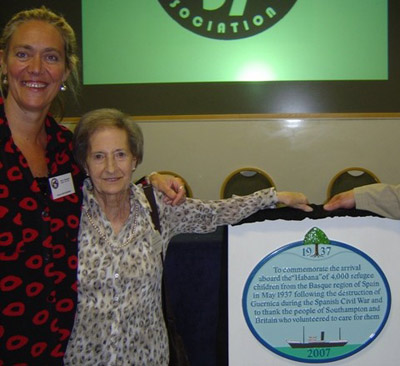basque heritage worldwide

05/17/2011

ADVERTISING
Southampton, United Kingdom. Coincidence, or maybe destiny, has brought Susana Sabin-Fernandez, of Biscay, to study the presence and memory of the Basque children of war in the UK. It’s destiny because her mother was part of the group evacuated on the Habana, along with her two sisters and one brother. Or maybe coincidence because many years later, Susana with a degree in Basque Philology, settled with her English companion near Southampton. It was out of curiosity that she would investigate this chapter in history, part of her own story that would culminate in the presentation of her thesis.
The Forgotten
The work is entitled, “The Basque Children of the Spanish Civil War in the UK: Memory and Memorialisation”. It analyzes the echo of this story and the very presence of these children of the war on English society.
"In the UK this issue had not been touched at all for many years, to the extent that many of them called themselves 'the forgotten' when I started my study in 2006”, explains the author. During the last few years, the story has come to light and there have been many documentaries made. The work of the association “Basque children of ’37” as well as the commemorative get-togethers has contributed to that as well.
Integration or Accumulation
Sabin-Fernandez has participated in these get-togethers for years, conducting interviews and observing their commemorative practices. “I’ve studied public and official observances as well as private ones, mainly the annual dinner in London always around the 21st of May, which marks the date that the Habana left Santurtzi in 1937, “she explains. The thesis studies the popular discourse, academia, politics and the press and how it creates and transforms identities.

[Some of the Children of War in the UK at the 2010 gathering. “They all got together for the photo and ended up singing. It was really beautiful,” remembers Susana (Photo SSabin-Fernandez)]
Sabin-Fernandez argues that rather than “integrate” into British society (meaning integration as a loss of identity in favor of that of the host country); the Basque children accumulated identities, being able to interact in both the Basque Country as in England.
“Even though they say at times that ‘here they consider me as a foreigner and there they call me English,’ they are capable of functioning at all levels in both societies. They are extremely capable of understanding and code switching; using the appropriate language when necessary. With average English they are extremely capable of understanding and being understood while at the same time, between them and with other immigrants, they also know exactly how to act", according to the author.
Researcher Daughter of a Refugee
Sabin-Fernandez admits that her closeness to the subject matter sometimes made her research more difficult. “I have gone through all of this with a double perspective; that of a researcher while also being the daughter and niece of those involved, at some level more human and personal. It wasn’t always easy to maintain objectivity during the analysis, but at the same time it has been very enriching”, she assures.

[Two Basque girls in the UK: on the right, Susana Sabin-Fernandez’s mother and on the left, one who stayed to live in England (photo SSabin-Fernandez)]
Despite increasing recognition, Sabin-Fernandez signals the media coverage that this group has received. “On the 70th anniversary of the children’s arrival, hugely celebrated in Southampton in May of 2007, attended by political figures and media from the Basque Country, in general the newspaper coverage was fairly influenced and directed to sell an emotional story. However, another story has been left out; the story regarding the merits that brought them here or the fact that they have not been compensated in any form, nor has anyone found a way to officially recognize their history", she argues.
ADVERTISING
ADVERTISING
ADVERTISING
ADVERTISING
ADVERTISING
© 2014 - 2019 Basque Heritage Elkartea
Bera Bera 73
20009 Donostia / San Sebastián
Tel: (+34) 943 316170
Email: info@euskalkultura.eus